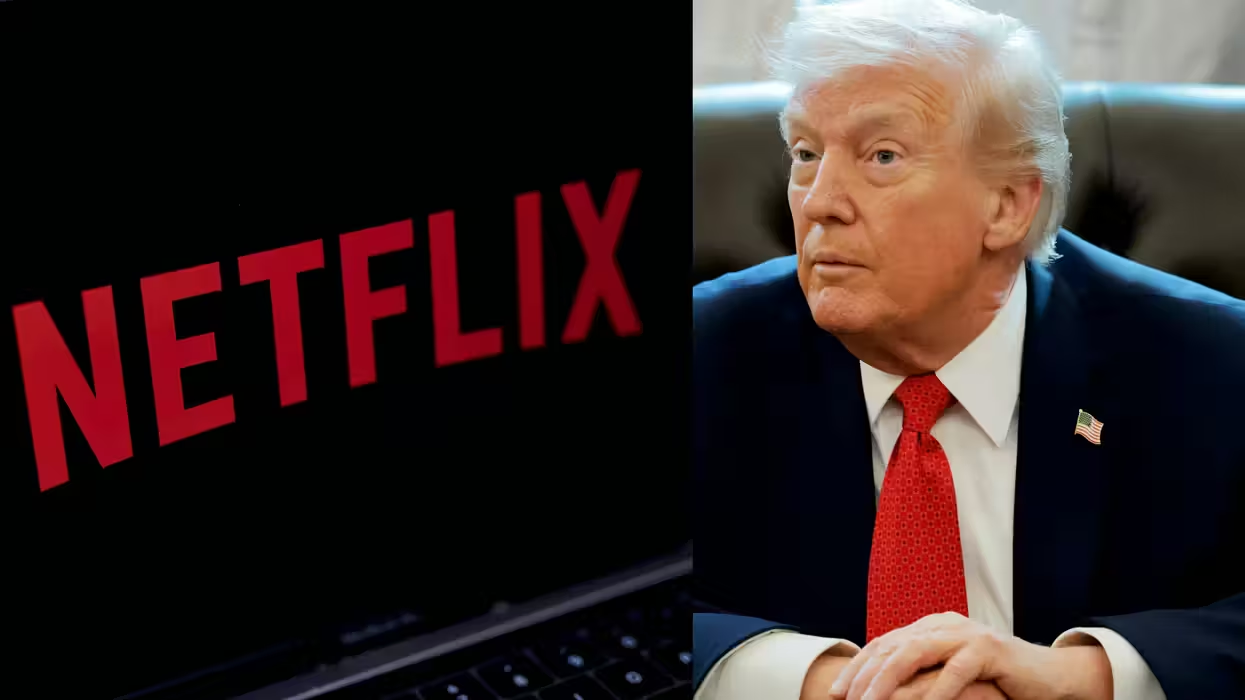
© 2025 Blaze Media LLC. All rights reserved.
Dinesh D'Souza's compelling and controversial new book, 'America,' in 20 quotes
June 09, 2014
"What the progressives seek is a suicide of national identity, a dissolution of the American era. This involves not merely a diminution of America but a diminution of Americans."

Conservative author, political commentator and filmmaker Dinesh D’Souza has a new book out, "America: Imagine a World Without Her," that will be the basis of a film of the same name that builds upon his highly successful," 2016 Obama's America."
Below are 20 quotes representative of the key themes and insights from his compelling and controversial new book, in which D'Souza seeks to take on the progressive narrative that America is an evil, colonialist, plundering, immoral enterprise, by examining their most important historical claims.
For more on "America," be sure to check out our explosive interview with Dinesh D'Souza, and should you be interested in more content like this, give Blaze Books a follow on Facebook and Twitter.
1. America is in the midst of committing national suicide
"I intend to show in this book that the American era is ending in part because a powerful group of Americans wants it to end. The American dream is shrinking because some of our leaders want it to shrink. Decline, in other words, has become a policy objective. And if this decline continues at the current pace, America as we know it will cease to exist. In effect, we will have committed national suicide."
[sharequote align="center"]"The American dream is shrinking because some of our leaders want it to shrink." [/sharequote]
2. This is due to the drive of progressives, whose ideology is premised on theft
"The term "progressive" harkens back to the progressive movement of the early twentieth century. Modern progressives invoke that movement, but they have formulated a much more comprehensive radicalism that goes far beyond anything that Theodore Roosevelt or Woodrow Wilson envisioned. Roosevelt and Wilson were traditional American patriots who wanted to enact reforms, but not remake an America they believed was fundamentally good, indeed great. The new progressive ideology proceeds from a powerful left-wing critique of America, one that grew out of the 1960s and has been refined and elaborated since then.
This critique builds on a single idea: theft. Clearly this is also the core idea of anti-colonialism. Listen to Franz Fanon, a leading anti-colonialist whom Obama said he read avidly in college. “The wealth of the imperial countries is our wealth too … The well-being and progress of Europe have been built up with the sweat and the dead bodies of Negroes, Arabs, Indians, and the yellow races … Europe is literally a creation of the Third World. The wealth which smothers her is that which was stolen from the under-developed peoples." This awareness, Fanon writes, produces "a double realization: the realization by the colonized peoples that it is their due and the realization by the capitalist powers that they must pay." Modern progressivism incorporates this theft accusation into a systematic critique of America and the West."
3. The progressive view, which conservatives have largely left unchallenged, relies on a distorted “history from below”
 A homeless man walks down the street in New York City. (June 19, 2011 - Source: Spencer Platt/Getty Images North America)
A homeless man walks down the street in New York City. (June 19, 2011 - Source: Spencer Platt/Getty Images North America)
"It is both interesting and morally commendable to look at the world from the point of view of the ordinary man, the little guy. How do the great events of the past and present affect him or her? Nations cannot be judged solely by how they make provision for the high and mighty. Rather, what matters is what kind of life a nation makes possible for the newcomer, the commoner, the low man on the totem pole."
4. To progressives, the "below" justly deserve reparations for theft; President Obama intends to do this on a global scale
"Much of the progressive expansion of government – from the welfare state to affirmative action – can be understood as America’s form of reparations for the crimes of history: not just slavery but also segregation, Jim Crow, and racism. Many blacks today still believe America owes them, and some advocate racial reparations in the form of cash payments. What does Obama think about reparations? Consider a revealing statement by one of his former students … Obama "told us what he thought of reparations. But in practice he didn’t think it was really workable." In order to have reparations, a society would have to settle such questions as "who is black, how far back do you go, what about recent immigrants," and so on. Considering such complexities, Obama rejected the idea of reparations for slavery … But while Obama rejects race-based reparations, I believe he has found a way to achieve global reparations. This involves large transfers of wealth from America to the rest of the world ... Obama seems convinced that wealth is at best appropriated or at worst stolen rather than earned. He seeks to use his power to take it back … In his view, he’s giving back to people what has been illicitly taken from them. Obama’s approach is supported by a theme in philosophy that goes under the name of "stolen goods..." If you are in possession of stolen goods, you have to return them. If you have acquired wealth by stealing or if you inherit goods that your ancestors stole from others, it’s not enough to say sorry or to provide token compensation. No, you must return what isn’t yours, and if you’ve used the wealth to accumulate more, then you must return that too."
[sharequote align="center"]"Obama seems convinced that wealth is at best appropriated or at worst stolen rather than earned."[/sharequote]
5. 'America' was written to turn the tables on the left...on their own terms
[instory-book ISBN=" 9781621572039"]
"I intend to turn the progressive critique on its head. I will demonstrate that the progressives are the real thieves, in that they use the power of the state to seize the property and possessions of people who have earned them. In the name of the ordinary citizen, progressives have declared war on the wealth creators. Yet they are not on the side of the ordinary citizen, because their policies lead to stagnation, impoverishment, indebtedness, and decline -- all in evidence today. It is progressives who rely on government seizure and bureaucratic conquest to achieve all their goals and increase their power. We work, and they eat. As we shall see, the progressives have a comprehensive scheme -- one that relies on deceit -- to win political support for their wealth confiscation. Most recently, in order to quell dissent, the progressives are implementing a chilling policy of national surveillance and selective prosecution -- using the power of the police to harass and subdue their opposition. Ultimately what the progressives seek is a suicide of national identity, a dissolution of the American era. This involves not merely a diminution of America but a diminution of Americans.
I intend to blow the whistle on these people, starting with Obama and continuing with Hillary Clinton and the whole progressive menagerie. Once the ordinary American understands how moral terms have been inverted, and how he is being conned by his self-styled partisans, he will rise up and repudiate his new oppressors who are none other than his old oppressors under a new name. America remains now, as it has long been, a solution to the global problem of scarcity and the human problem of how to achieve prosperity and happiness. The world needs America, but only Americans can restore the formula for prosperity and human flourishing to the benefit of untold millions, here and everywhere, now living or yet to come."
6. The concept of "becoming American" in and of itself is a unique rite
 (Image Source: AP)
(Image Source: AP)
"In a manner your ancestors in the old country would have thought impossible, you resolve to stop thinking of yourself as Irish; instead, you "become American." And to your amazement you realize that you can do this. If you thought about it, you would realize how strange it is. No one can move from some other country to Ireland and "become Irish," any more than they can move to India and "become Indian." To be Irish you need Irish ancestors and Irish blood. To be Indian you need brown skin and Indian parents. By contrast with Ireland, India, and other countries, America is defined not by blood or birth but by the adoption of the nation’s Constitution, its laws, and its shared way of life. That's how the Irish, the Italians, and the Jews, and today the Koreans, the South Asians, and the West Indians, can all come to this country and in time 'become American.'"
[sharequote align="center"]America is defined not by blood or birth but by..[its] Constitution..laws..[and] shared way of life[/sharequote]
7. President Obama’s past indicates he does not hold such a view
 Frank Marshall Davis (Image Source: Wikipedia)
Frank Marshall Davis (Image Source: Wikipedia)
"Frank Marshall Davis, the former Communist who was Obama’s mentor in Hawaii, was so radical that he opposed President Truman's Marshall Plan as a "device" for maintaining "white imperialism." Truman and Marshall, he wrote, were using "billions of U.S. dollars to bolster the tottering empires of England, France, Belgium, Holland, and the other western exploiters of teeming millions." Indeed the objective of America after World War II was "to re-enslave the yellow and brown and black peoples of the world." While Davis spurned America he praised "Red Russia" as "my friend." Young Obama – sitting in Davis’s hut in Hawaii week after week for several years – took it all in. This portrait of devoted young Obama imbibing the ravings of a pot-smoking former Communist is the progressive version of a Norman Rockwell painting."
8. This can be largely attributed to the great split of the ‘60s
"Recall that this is the first time that America truly had a generation gap," a chasm between parents and children. In previous generations, children wanted to be like their parents. They wanted, as quickly as possible, to grow up and become adults. In the 1960s, however, children regarded themselves as morally superior to their parents, even while indulging in irresponsible behaviors like lawlessness and drug-taking that their parents had never even considered … So America is now divided into the group that is a product of the 1960s, and the group that never quite embraced the values of the 1960s. Over time, the generation gap has become an ideological gap. The parents, in a sense, represented the spirit of 1776 and their children the new spirit of 1968."
9. Those of the ‘60s repudiated the “greatest generation”
[sharequote align="center"]The greatest generation failed in one...respect: it could not produce another great generation[/sharequote]
"There was angst aplenty in the 1960s, and we must look for its deeper cause, the cause that can help explain the emergence of the spirit of 1968. We are looking for the origins of a new sensibility in America that approached issues like Vietnam, feminism, Civil Rights, and the sexual revolution in a way that no previous generation – certainly no the preceding generation – would have. I got a valuable clue to the answer some years ago when I read Tom Brokaw’s book The Greatest Generation. This book celebrates the virtues of the generation that grew up between the two world wars. As I read Brokaw’s book, I asked myself: What made the "greatest generation" so great? The answer is twofold: the Depression and World War II. The virtues of that generation were the product of scarcity and war. Hardship and need forged the admirable qualities of courage, sacrifice, and solidarity. But the greatest generation failed in one important respect: it could not produce another great generation."
10. Why didn’t the "greatest generation" produce another great generation?
"The obvious answer is affluence. The parents of the greatest generation wanted their children to have the advantages they never had. And in giving their children everything they wanted, the frugal, self-disciplined, sacrificial generation of World War II produced the spoiled children of the 1960s — the Clinton generation. Ironically the generation that came to revile capitalism was produced by the largesse of capitalism. This outcome had been predicted a generation earlier by the economist Joseph Schumpeter. Schumpeter warned that capitalism produces a “gale of creative destruction” that topples traditional institutions and traditional mores. Specifically, Schumpeter predicted that the abundance of capitalism would erode the qualities of hard work, self-discipline, and deferred gratification that produced that abundance in the first place."
[sharequote align="center"]"The generation that came to revile capitalism was produced by the largesse of capitalism."[/sharequote]
11. And the progressive influence merely spread – via the classroom
 Vice President Joe Biden talks with children in a classroom while visiting the East Lake Family YMCA (Image Source: AP Photo/David Goldman)
Vice President Joe Biden talks with children in a classroom while visiting the East Lake Family YMCA (Image Source: AP Photo/David Goldman)
"By the mid-1980s, the sit-ins and love-ins that had defined the 1960s themselves became archaic and incomprehensible. Michel Foucault was dead, and the gay bathhouses were closed. So what did the activists do? Many of them did what Bill Ayers did – they became teachers. Far from abandoning their ideology, they carried it with them into the school and college classroom.
As Ayers points out, teaching is for him simply activism by another name. During our Dartmouth debate, I asked Ayers whether he had given up trying, bin-Laden style, to bomb U.S. government buildings, and whether this meant he was no longer a revolutionary. Ayers answered that he was still a revolutionary, in the sense of seeking fundamental social transformation, but he had now figured out a better way to achieve that goal, namely through the classroom.
Comparing his old life as a terrorist with his new one as a professor, Bill Ayers writes, "Revolutionaries want to change the world, of course, and teachers, it turns out, want to change the world too."
By withdrawing temporarily from the political sphere, the activists of the 1960s intended to consolidate their power by raising up a new generation—a generation that might be even more successful than they had been. A conservative era was coming—the election of Reagan made that clear—but perhaps out of the ashes, through the efforts of its committed followers, the spirit of 1968 might rise again."
12. And a Hillary Clinton presidency will blow things out of the water
 Cropped image from the New York Times Magazine's "Planet Hillary" cover dated January 26, 2014. (Image Source: The WIre)
Cropped image from the New York Times Magazine's "Planet Hillary" cover dated January 26, 2014. (Image Source: The WIre)
"If Hillary Clinton is elected in 2016, the baton will have passed from one Alinskyite to another. In this case, Alinsky’s influence will have taken on a massive, almost unimaginable, importance. Obama will have had eight years to remake America, and Hillary will have another four or perhaps eight to complete the job. Together, these two have the opportunity to largely undo the nation’s founding ideals. They will have had the power, and the time, to unmake, and then remake America. They may not be responsible for the suicide of America, but they certainly will have helped to finish off a certain way of life in America, and they will leave us with a country unrecognizable not only to Washington and Jefferson but also to those of us who grew up in the twentieth century. If they succeed there may be no going back. Then it will be their America, not ours, and we will be a people bereft of a country, with no place to go."
13. Turning to history, the progressive view of "theft" hurt the Native Americans the government purported to want to help
 A rundown mobile home in Standing Rock Reservation in Fort Yates, N.D. (Image Source: AP Photo/Kevin Cederstrom)
A rundown mobile home in Standing Rock Reservation in Fort Yates, N.D. (Image Source: AP Photo/Kevin Cederstrom)
"For many decades now, the U.S. government has tried to make restitution to Indians for broken promises and repudiated agreements. Unfortunately, the result has been to make large numbers of Indians dependent on the federal government. Many Indians today live on reservations without working, subsisting off the federal dole. I drove across the Pine Ridge reservation with Charmaine White Face. We saw the dilapidated trailers the Indians lived in. In every village, there were stray dogs barking loudly. I saw in the Indians, especially the young men, the same look of hopelessness that I used to see among slum-dwellers in Mumbai. "This is a terrible place to live," White Face told me. I asked her if she trusted the federal government. She snorted. "Never! Look what they have done to our people. They promise to protect you, and then they destroy you." I mentioned Obamacare. Her only response was, 'Get ready.'"
14. And restitution would actually in and of itself be a form of theft
 Mount Rushmore National Memorial in the Black Hills of South Dakota.
Mount Rushmore National Memorial in the Black Hills of South Dakota.
(Image Source: AP)
"The Indians have gotten a bad deal. I’m not saying it is a good deal. At the same time, we should be clear about what the alternatives are. It makes no sense to say, "Give us back Manhattan." We cannot give you back Manhattan because Manhattan was never yours. You sold a piece of land that was virtually worthless and on it others have built a great and glorious city. It is unjust to demand back what was never yours in the first place. Then you say, "Give us back the Black Hills." You point out that there is uranium and other minerals in those hills, and now that land is worth a fortune. Once again, no Indian tribe knew how to mine uranium and no Indian tribe knew what to do with uranium if they had it. Other Americans have added value to the Black Hills by figuring out how to tap its resources, and now the Indians want the land back so they can take advantage of what others have figured out how to do."
[sharequote align="center"]"It is unjust to demand back what was never yours in the first place."[/sharequote]
15. The same can be said of America vis-à-vis Mexico
"Consider the claims we hear today about how Mexicans merely want to return and work on their own land that was unjustly taken. But no land was taken from them at all. After the war, the United States immediately recognized as valid the property rights of Mexicans who were now part of U.S. territory. The change was not in any individual’s land ownership but in the fact that people who were once Mexicans now became Americans.
While progressives deplore American aggression, one wonders whether there are Mexicans who wish America had been more aggressive. What we do know is that the vast majority of Mexicans who ended up on the American side of the border, following the Mexican War, never attempted to return to Mexico. And neither have their descendants."
16. D'Souza's view on reparation for slavery is more nuanced -- and arguably controversial
"Did America owe something to the slaves whose labor had been stolen? I think it did, although Frederick Douglass, of all people, largely disagreed. Speaking to the Massachusetts Anti-Slavery Society just days before the Civil War ended, Douglass raised the question: What must be "done" for the former slaves? Here is Douglass’s answer. "Do nothing with us! Your doing with us has already played the mischief with us. Do nothing with us … If the Negro cannot stand on his own legs, let him fall. All I ask is, give him a chance to stand on his own legs! Let him alone … If you will only untie his hands and give him a chance, I think he will live."
And what about today?...What is owed is more than money can pay; we discharge our debt by honoring and remembering...That debt...is best discharged through memory, because the slaves are dead and their descendants--this will be a hard pill for progressives to swallow--are better off as a consequence of their ancestors being hauled from Africa to America.
[sharequote align="center"]What is owed is more than money can pay; we discharge our debt by honoring and remembering[/sharequote]
Better off? This point is illustrated by the great African America boxer Muhammad Ali...Ali won the fight [the "rumble in the jungle" against George Foreman in Zaire in the 1970s], and upon returning to the United States, he was asked by a reporter, "Champ, what did you think of Africa?" Ali replied, "Thank God my grandaddy got on that boat!" There is a characteristic mischievous pungency to Ali's remark, yet it also expressed a widely held sentiment. Ali recognized that for all the horror of slavery, it was the transmission belt that brought Africans into the orbit of Western freedom. The slaves were not better off--the boat Ali refers to brought the slaves through a horrific Middle Passage to a life of painful servitude--yet their descendants today, even if they won't admit it, are better off. Ali was honest enough to admit it.
So was the black feminist writer Nora Zeale Hurston. Of slavery she wrote, "From what I can learn it was sad. Certainly. But my ancestors who lived and died in it are dead. The white men who profited by their labor and lives are dead also. I have no personal memory of those times, and no responsibility for them. Neither has the grandson of the man who held my folks....I have no intention of wasting my time beating on old graves....Slavery is the price I paid for civilization, and that is worth all that I have paid through my ancestors for it."
Our case is settled not by Ali or Hurston but by the actual choices made by African Americans from the end of the Civil War to the present...The idea of colonization disappeared after the Civil War because black leaders like Frederick Douglass realized that their premises were wrong...America was founded by white men, but it was not founded as a white man's country. America was founded on the principle of equality--not just equal dignity, but also the equal right of people to govern themselves and advance themselves and freely sell their labor...Today's African Americans, like all Americans, have the immeasurable benefit of living with freedom and opportunity in a country big enough to realize human dreams."
17. For those who say America is colonialist
"There is a deeper factual point that often goes unrecognized in the anti-colonial literature. In that literature we read innumerable claims to the effect that "the Europeans stole rubber from Malaya, and cocoa from West Africa, and tea from India." But as economic historian P.T. Bauer points out, before British rule, there were no rubber trees in Malaya, nor cocoa trees in West Africa, nor tea in India. The British brought the rubber tree to Malaya from South America. They brought tea to India from China. And they taught the Africans to grow cocoa. In these cases, far from "stealing" native resources, the British deserve credit for introducing profitable crops that benefited native economies as well as British global trade."
18. The West invented invention
 (Image Source: AFP/Getty Images)
(Image Source: AFP/Getty Images)
"It makes no sense to claim that the West grew rich by taking everybody else’s stuff for the simple reason that there wasn’t very much to take. Most Third World countries were desperately poor before colonization, so they could hardly be worse off in material terms after the colonizers went home. How, then, did the West become affluent if not by stealing from Asia, Africa, and South America? The reason is the West invented some new things that didn’t exist before. These inventions were modern science, modern technology, and modern capitalism. Science here refers not merely to invention but to what Alfred North Whitehead terms "the invention of invention," a new mechanism for generating knowledge and converting that knowledge into usable technological products. Capitalism here refers not merely to trade but to property rights, contracts, courts to enforce them, and later limited liability, credit, stock exchanges, insurance, and the whole ensemble of institutions that Adam Smith outlined in the 'Wealth of Nations.'"
19. Meanwhile, under the guise of correcting supposed injustices, wealth redistribution is itself unjust
"Imagine a fellow who has worked hard to achieve a good position in a company or who has built a successful firm. He is watching TV one evening when policemen show up at his door and start carrying away his furniture, his TV, and his other possessions. When he demands to know what’s going on, they inform him that he is a thief. Since he has never been convicted of anything, the man is non-plussed, but the police assure him that, while the specific time of the theft is unclear – it could have been through his business, or through his country’s actions abroad, or through something his ancestors did – nevertheless he is no longer entitled to what he has, and the government is now going to confiscate it. Such a man, accused of robbery, will naturally feel that he is being robbed. In the name of correcting a supposed injustice, a grave injustice is being inflicted on him. Such is the situation facing all successful people in the age of Obama."
[sharequote align="center"]"In the name of correcting a supposed injustice, a grave injustice is being inflicted on him."[/sharequote]
20. In the final analysis, the Leftist critique falls of its own weight
"Progressives have convinced people that they are fighting theft. If a greedy capitalist has looted your possessions, you would want the government to do something about it. An essential function of government is to bring thieves to justice and to restore stolen possessions to their rightful owners. If the progressive critique is valid, then it doesn’t matter if government does it inefficiently, since there is no one else to do the job: inefficient justice is better than no justice … This is why I’ve devoted the bulk of this book to refuting the theft critique. If I’ve succeeded, then the whole progressive argument collapses and our federal government, far from being an instrument of justice, now becomes an instrument of plunder."
Note: The links to the book in this post will give you an option to elect to donate a percentage of the proceeds from the sale to a charity of your choice. Mercury One, the charity founded by TheBlaze’s Glenn Beck, is one of the options. Any donations to Mercury One are fully tax-deductible and go towards efforts such as tornado relief, preparedness training, and veterans support.
_
Follow TheBlaze Books on Twitter and Facebook.
Want to leave a tip?
We answer to you. Help keep our content free of advertisers and big tech censorship by leaving a tip today.
Want to join the conversation?
Already a subscriber?
more stories
Sign up for the Blaze newsletter
By signing up, you agree to our Privacy Policy and Terms of Use, and agree to receive content that may sometimes include advertisements. You may opt out at any time.
Related Content
© 2025 Blaze Media LLC. All rights reserved.
Get the stories that matter most delivered directly to your inbox.
By signing up, you agree to our Privacy Policy and Terms of Use, and agree to receive content that may sometimes include advertisements. You may opt out at any time.






